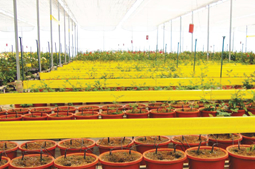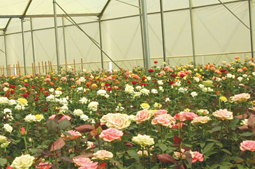 Ask any coach and He will tell you that when his fate depends on competitors’ match, the situation is out of control. So, it is with Kenya’s flower sector as our fate in the flower sector is determined by others. The truth is, we are in a catch 22 situation. This is the time for Kenya to think outside the Box and redeem its flower and export sector.
Ask any coach and He will tell you that when his fate depends on competitors’ match, the situation is out of control. So, it is with Kenya’s flower sector as our fate in the flower sector is determined by others. The truth is, we are in a catch 22 situation. This is the time for Kenya to think outside the Box and redeem its flower and export sector.
Flower farms push for special zones Flower producers want the enterprises granted Special Economic Zones (SEZ) status to cushion them against runaway costs that are fast eroding competitiveness in the export markets. Kenya Flower Council chief executive Clement Tulezi said while the SEZ Act was assented to in September, 2015, and came into effect on December 15, 2015, regulations to operationalise it were yet to be gazetted.
“We deal in export-bound only products that warrants us to enjoy SEZ status. New regulations will create licensing processes and state fees applicable while enabling flower enterprises to enjoy tax benefits that come with this authorised economic operator special status,” he said. Mr Tulezi said SEZ the status will help ease challenges attributed to new punitive regulations on control of plastics and double inspection of imported fertilisers.

 Kibiru is a Dedicated, self-motivated, enthusiastic and strategic thinking professional with 10 years’ experience in the Agriculture sector as an Agronomist. Well versed in all phases of horticultural crop production, specifically in floriculture and Olericulture, People management, production and sustainable use of conventional crop protection agents in harmony with the Bio- control agents. Experienced in managing projects from requirements gathering/ needs identification phase all through to completion.
Kibiru is a Dedicated, self-motivated, enthusiastic and strategic thinking professional with 10 years’ experience in the Agriculture sector as an Agronomist. Well versed in all phases of horticultural crop production, specifically in floriculture and Olericulture, People management, production and sustainable use of conventional crop protection agents in harmony with the Bio- control agents. Experienced in managing projects from requirements gathering/ needs identification phase all through to completion. The Global Biopesticides Market was valued at USD 3147.1 million in 2018 and is expected to register a CAGR of 14.1% during the forecast period (2019-2024). Of all the regions, South America is expected to witness the fastest growth in the forecast period, recording a CAGR of 16.4%. In addition, the United States is likely to be the largest individual market over the forecast period.
The Global Biopesticides Market was valued at USD 3147.1 million in 2018 and is expected to register a CAGR of 14.1% during the forecast period (2019-2024). Of all the regions, South America is expected to witness the fastest growth in the forecast period, recording a CAGR of 16.4%. In addition, the United States is likely to be the largest individual market over the forecast period. The Agriculture Industry, which is the backbone of our economy, is facing multiple threats from the growth of fake pesticides. According to a latest study conducted, the fake pesticides industry in India was estimated at billions of US dollars globaly, which account for 25 per cent by value and 30 per cent by volume of the domestic pesticides industry . The Study indicates that this market is expected to grow at the rate of 20 per cent per annum in terms of value, and if not addressed, can reach to approximately 40 per cent share by value in the pesticides industry by 2019. The problem is extreme in many countries including Kenya.
The Agriculture Industry, which is the backbone of our economy, is facing multiple threats from the growth of fake pesticides. According to a latest study conducted, the fake pesticides industry in India was estimated at billions of US dollars globaly, which account for 25 per cent by value and 30 per cent by volume of the domestic pesticides industry . The Study indicates that this market is expected to grow at the rate of 20 per cent per annum in terms of value, and if not addressed, can reach to approximately 40 per cent share by value in the pesticides industry by 2019. The problem is extreme in many countries including Kenya.
 The Export Promotion Council (EPC) held the 1st inaugural Kenya Exporter of the Year Awards (KEYA) on 15th July 2019 at KICC aimed to recognize firms that have made significant contribution to the development of the economy through exemplary business performance.
The Export Promotion Council (EPC) held the 1st inaugural Kenya Exporter of the Year Awards (KEYA) on 15th July 2019 at KICC aimed to recognize firms that have made significant contribution to the development of the economy through exemplary business performance.